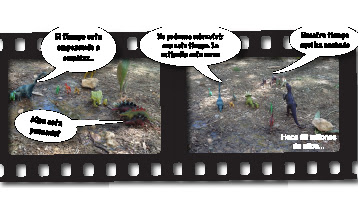TPACK.
It was the exercise we did during the second week of the course, in ithis activity, each group (consisted of 4 or 5 person) had to present their work done on the TPCK in the class based on a poster to guide our explanation.
The Star did not explained the presentation to the whole class, but the groups were rotating she explain it individually for each group. The rest of the components of the group that were not the stars and were rotated for each exposure had to aim a good deed and a bad one for each group. There are many types of posters in which we find clear and other not so clear, with endless dates or too much text.
Color chameleons: exposed quickly and clearly known show the contents. The poster was very brief.
Never too late: it was the only group that made ??a salutation and English was very fluent and good.
I know what you did: English was undoubtedly very good but not too light poster.
Broken Dreams: his poster was the most complete but thought it might have more fluidity and interaction with listeners.
The Chalks' Drivers: very cheerful and the exposure was complete but should have been more fluid and have prepared better exposure.
Hakuna Matateros: a fair presentation that showed it comfortable but the poster was too confusing to understand. He put many examples to better clarify the process.
At the end of the class discussed by all if we had used or not perform the exercise in which we all agreed that if because thanks to the explanation of different ways with different media had made us better internalize the process of TPCK. As we said constructive criticism that we should be more fluid when giving a class, we should look at the face of our listeners and take away the shame, take out the teacher's voice to speak up, do a little introduction ...
In general, our teacher said that to be the first show was not bad.
 |
| The Best Group of Bilingual |
1. What was the best part of the activity?
In general the activity has been quite positive, but
certainly the best parts was hearing the presentations of our peers and see
their murals as it has been quite interesting. Besides, although it has been
the first presentation Linda has said that it has been very successful and she
has congratulated us for our work.
2. What was the worse?
In our opinion the worst part was the exposition
because it was the first time that we display a long work in English, we were
so nervous and didn't know very well what we had to do and how to organize the
work because of we didn't know the working way of the teacher.
3. What was the best moment of the week (in the work of
the group)?
The best moment was when we met on Thursday to prepare
among all the presentation, what the star was going to say and how we were
going to organize the exposition. While we were doing the work, we had a great
time laughing and sharing stories of class. That was the best moment, but when
we are together we always usually have a great time.
4. What do you
need to improve –as a group- for the next weeks?
We must agree on flexible working hours for each, the
days of meet and the organization within the group and the role of each person.
5. What have you learnt?
We have learned what TPACK is and how important is
that the teacher carried out for there to be a meaningful learning, as well as
the different parts that it has and what is used each of them.
6. What do you need to conserve -as a group- for the next
weeks?
We cannot ever change the motivation which we work,
our good relationship and what fun we had when we work together.
7. What do you
need to improve –as a group- for the next weeks?
We must agree on flexible working hours for each, the
days of meet and the organization within the group and the role of each person.
This
week, we worked on the concept of TPACK. This experience was very
enriching, and therefore, my work has consisted of investigate the
definition of TPACK and their greater representative Lee Shulman
Technological
Pedagogical Content Knowledge
(TPACK) is a structure to understand and describe the kinds of
knowledge needed by a teacher for effective pedagogical practice in a
technology improved learning environment. The idea of pedagogical
content knowledge (PCK) was first described by Lee Shulman (Shulman
1986) and TPACK builds on those core ideas.
Lee S. Shulman is
an educational psychologist who
has made notable contributions to the study of teacher education,assessment of
teaching, and education in the fields
of medicine, science and mathematics.
He is a professor emeritus at the Stanford
University School of Education,
and the recipient of several awards recognizing his educational
research. From 1963 to 1982, Shulman was a faculty member at Michigan
State University,
where he founded and co-directed the Institute for Research on
Teaching (IRT).
Among his many
achievements, Shulman is credited with bringing the phrase "Pedagocical Content Knowledge"
(PCK)"
into research discourse.
 |
| Color Chameleons |
 |
| Hakuna Matateros |
 |
| I know what you did |
 |
| Never too late |
 |
| Broken Dreams |
 |
| The Chalk's Drivers |
|
|
|
|
|
|
|
|
|
Facilitator: María García Buendía
Journalist: Irene Aroca
Analist: MªÁngeles Aabenza
Tracker: Marta Gimenez Peinado


















